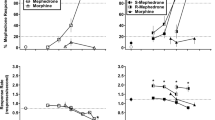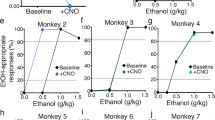Heading
Abstract
Rationale. The current study was designed to extend our knowledge of the N-methyl-D-aspartate (NMDA) glutamate receptor system in mediating the discriminative stimulus effects of ethanol in non-human primates.
Objectives. To characterize the discriminative stimulus effects of the NMDA uncompetitive antagonists dizocilpine, phencyclidine (PCP) and ketamine in male and female monkeys under different ethanol training conditions.
Methods. Adult male (n=8) and female (n=9) cynomolgus monkeys (Macaca fascicularis) were divided into four groups and trained to discriminate 1.0 g/kg ethanol (n=8) versus water or 2.0 g/kg ethanol (n=9) versus water in a 2×2 design with training dose and sex as main group factors. Ethanol (20% w/v) solutions were administered intragastrically (IG) and responding was maintained under a fixed ratio schedule of food reinforcement. Dose-response determinations for dizocilpine [IG and intramuscular (IM)], PCP (IM) and ketamine (IM) were made under two training intervals (30 and 60 min).
Results. Dizocilpine, PCP and ketamine dose-dependently substituted for ethanol in three of four training conditions, the notable exception being in males trained with 2.0 g/kg ethanol. Ethanol-like discriminative stimulus effects were greater with IM dizocilpine than with IG dizocilpine. At the lower ethanol training dose (1.0 g/kg), there were no sex differences in the ethanol-like discriminative stimulus effects of dizocilpine, PCP or ketamine, nor were there sex differences in the potencies to produce ethanol-like discriminative stimulus effects. Sex differences were readily apparent with the higher ethanol training dose (2.0 g/kg), with the NMDA ligands failing to substitute for ethanol in male monkeys, probably due to the rate-suppressive effects of these compounds.
Conclusions. These data suggest that NMDA receptor-mediated activity is a component to the discriminative stimulus effects of ethanol in male and female nonhuman primates. However, NMDA uncompetitive antagonists were less likely to produce discriminative stimulus effects similar to a high ethanol training dose in male monkeys. In comparison to consistent substitution by GABAA positive modulators for ethanol, substitution patterns produced by NMDA uncompetitive antagonists suggest a less robust mediation of the ethanol discriminative stimulus through NMDA receptor systems in nonhuman primates.
Similar content being viewed by others
Author information
Authors and Affiliations
Additional information
Electronic Publication
Rights and permissions
About this article
Cite this article
Vivian, J.A., Waters, C.A., Szeliga, K.T. et al. Characterization of the discriminative stimulus effects of N-methyl-D-aspartate ligands under different ethanol training conditions in the cynomolgus monkey (Macaca fascicularis). Psychopharmacology 162, 273–281 (2002). https://doi.org/10.1007/s00213-002-1086-2
Received:
Accepted:
Issue Date:
DOI: https://doi.org/10.1007/s00213-002-1086-2




